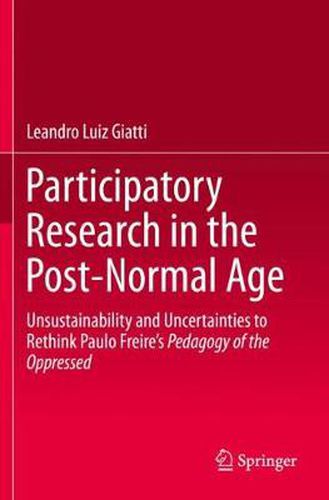Readings Newsletter
Become a Readings Member to make your shopping experience even easier.
Sign in or sign up for free!
You’re not far away from qualifying for FREE standard shipping within Australia
You’ve qualified for FREE standard shipping within Australia
The cart is loading…






This title is printed to order. This book may have been self-published. If so, we cannot guarantee the quality of the content. In the main most books will have gone through the editing process however some may not. We therefore suggest that you be aware of this before ordering this book. If in doubt check either the author or publisher’s details as we are unable to accept any returns unless they are faulty. Please contact us if you have any questions.
This book shows how participatory research can provide tools to overcome the current epistemic and ethical challenges faced by traditional scientific approaches. Ever since Funtowicz and Ravetz proposed the notion of post-normal science, there has been a growing awareness of the limits of a form of knowledge production based only on the traditional scientific peer communities that excludes other social groups affected by its results and applications. The growing uncertainty and complexity posed by socio-ecological issues in the interactions between science, society and decision making has revealed the importance of a social quality control over crucial decisions that rely on scientific research and the necessary democratization of knowledge to tackle sustainability and health concerns.
Departing from a reinterpretation of Paulo Freire’s Pedagogy of the Oppressed, this volume shows how participatory research can contribute to reconnect science and society by extending peer communities through the incorporation of different forms of knowledge and different social actors into research projects. To do so, the author presents a critical review of different participatory research approaches, identifying the elements that distinguish a true participatory research from a traditional one, and proposing a taxonomy of the various participatory methodologies. The volume also analyzes a diversity of social practices and understandings that deal with an ecology of knowledge and its systemic characteristics. Moreover, it demonstrates that uncertainties can be integrated in dialogical processes that open possibilities for a myriad of outcomes.
Participatory Research in the Post-Normal Age - Unsustainability and Uncertainties to Rethink Paulo Freire’s Pedagogy of the Oppressed will be of interest to researchers working with participatory approaches in different fields like health, environmental sciences, and education, as well as to practitioners of action research concerned with scientific dilemmas and counter-hegemonic strategies.
$9.00 standard shipping within Australia
FREE standard shipping within Australia for orders over $100.00
Express & International shipping calculated at checkout
This title is printed to order. This book may have been self-published. If so, we cannot guarantee the quality of the content. In the main most books will have gone through the editing process however some may not. We therefore suggest that you be aware of this before ordering this book. If in doubt check either the author or publisher’s details as we are unable to accept any returns unless they are faulty. Please contact us if you have any questions.
This book shows how participatory research can provide tools to overcome the current epistemic and ethical challenges faced by traditional scientific approaches. Ever since Funtowicz and Ravetz proposed the notion of post-normal science, there has been a growing awareness of the limits of a form of knowledge production based only on the traditional scientific peer communities that excludes other social groups affected by its results and applications. The growing uncertainty and complexity posed by socio-ecological issues in the interactions between science, society and decision making has revealed the importance of a social quality control over crucial decisions that rely on scientific research and the necessary democratization of knowledge to tackle sustainability and health concerns.
Departing from a reinterpretation of Paulo Freire’s Pedagogy of the Oppressed, this volume shows how participatory research can contribute to reconnect science and society by extending peer communities through the incorporation of different forms of knowledge and different social actors into research projects. To do so, the author presents a critical review of different participatory research approaches, identifying the elements that distinguish a true participatory research from a traditional one, and proposing a taxonomy of the various participatory methodologies. The volume also analyzes a diversity of social practices and understandings that deal with an ecology of knowledge and its systemic characteristics. Moreover, it demonstrates that uncertainties can be integrated in dialogical processes that open possibilities for a myriad of outcomes.
Participatory Research in the Post-Normal Age - Unsustainability and Uncertainties to Rethink Paulo Freire’s Pedagogy of the Oppressed will be of interest to researchers working with participatory approaches in different fields like health, environmental sciences, and education, as well as to practitioners of action research concerned with scientific dilemmas and counter-hegemonic strategies.